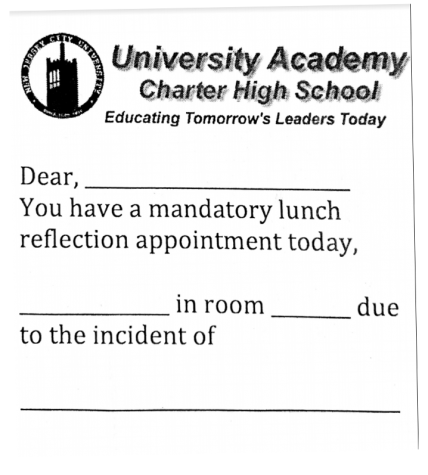Out with Detention, in with Reflection
March 30, 2020
 UACHS once utilized detention as a disciplinary tool for students. As of four years ago, this form of reprimand was abolished. Now, our school uses lunch reflection as an alternative for detention after seeing that it was ineffective.
UACHS once utilized detention as a disciplinary tool for students. As of four years ago, this form of reprimand was abolished. Now, our school uses lunch reflection as an alternative for detention after seeing that it was ineffective.
The idea of lunch reflection came from the Director of Grants and Special Programs, Joe Timpanaro.
“It is a logical practice , this is better for students to talk about their mistakes so they can learn from their actions and try not to repeat them,” said Timpanaro. “I talk to students and remind them what is in the handbook so they know what rules they have to conform to.”
When UACHS used to offer detention hours, students did not attend at times. This resulted in the staff needing a better solution to enforce the rules.
“I have been here for 14 years and there used to be two hour Thursdays and four hour Saturdays. I actually ended detention and found other ways to go about things so I don’t have to punish kids,” said Timpanaro.
There has been a repetitive cycle at UACHS where older students affect the behavior of the younger ones. However, the school wants to see a change in the way students influence each other.
“If one student is getting away with being out of uniform and having their headphones in, then others begin to do the same thing which makes a big problem,” said Timpanaro.
Many students are aware that they break the rules, and they often don’t think they deserve to deal with the consequence of doing so. Senior, Juwan Smith, is known for constantly getting in trouble and does not see the point of lunch reflection.
“I think it’s a waste of time and energy. Reflection is not going to change the students’ behavior, they have to change themselves,” said Smith.
Most students view the lunch reflections as useless. Their negative perspectives on this alternative can result in them not showing up when advised. This can become an issue when trying to emphasize the rules.
“For the students who decide not to cooperate, we just have to find another way to get through to them so they can take the rules more seriously,” said Timpanaro.
While many think this alternative is another form of punishment, Timpanaro suggests that lunch reflection is not meant to be looked at that way. It is meant as a learning experience for students to consider their actions and understand the importance of following the rules. His intentions are not to make things harder for us.
“My goal is to shape the culture of this school. We want to modify behavior in a positive way,” said Timpanaro.
Students who do not usually break any major rules often agree with the administration, recognizing that they are attempting to improve students’ behaviors. Jaqual Halley, senior class president, has a more positive view on this new tactic.
“I think this is better than having kids sit at the front because that doesn’t really help them learn from the mistakes they’ve made,” said Halley.
Ever since lunch reflections started, administration has recognized a change in the behavior and attitudes of students.
“Students that I’ve talked to about their actions are actually helping me by advising other students on doing the right thing so they wouldn’t have to face any consequences,” said Timpanaro.
Instead of students facing serious repercussions, lunch reflections will be continued throughout the year in hopes of effectively enforcing the rules.